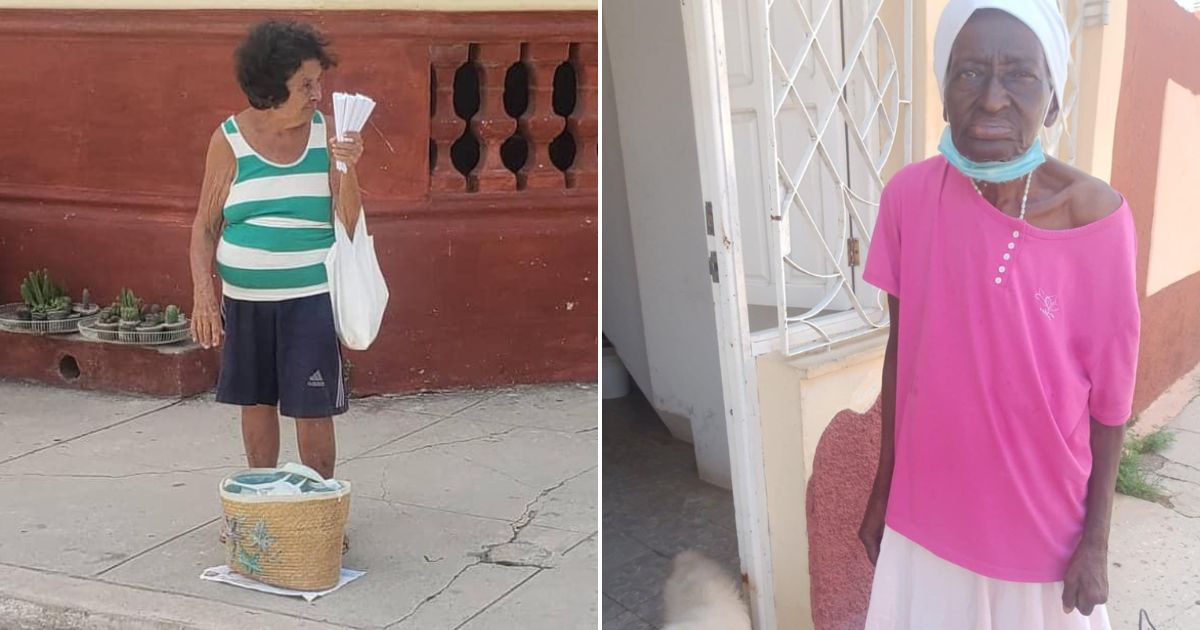In a heartwarming display of solidarity and community support, a group of Cubans launched a fundraising campaign this Monday to assist two elderly street vendors in the city of Cárdenas, who have spent much of their lives working in the streets.
The initiative began with a post by Christian Arbolaez in the Facebook group "Cardenenses en Facebook," where he inquired if anyone remembered the lady who sold peanuts at the corner of Vives and Calzada. To his surprise, the lady still sells peanuts at the same spot, along with another elderly woman who sells Chinese squash.
The young man and another group member, identified as Kiriart, discussed the idea of offering help to these women, who, despite their advanced age, continue to work to survive. "We aim to collect a minimum of 20,000 CUP for each of them. There are more than 42,000 people in this group, and if only 5,000 of us donate 100 CUP, we could reach and exceed this goal," he noted.
Arbolaez explained that Kiriart will be responsible for collecting the funds and delivering the donations to the vendors. He added that if monetary donations are not possible, they would also accept any kind of donation, such as women's clothing, cologne, soap, or similar items, which can be dropped off at Refinería 476, corner of Coronel Verdugo.
The fundraising will be conducted through various means, including transfers to CUP and MLC cards, as well as donations via PayPal and Zelle.
Lastly, Arbolaez justified the initiative by arguing that these two vendors have been constant figures in the lives of the inhabitants of Cárdenas, forming part of the cultural landscape of the city for many years.
The elderly in Cuba constitute one of the most unprotected and vulnerable groups, facing a severe lack of governmental support. This issue leaves them exposed to problems such as medicine and food shortages, exacerbating their plight. This situation has often motivated activists to care for the elderly.
Recently, a young Cuban provided humanitarian aid to an unprotected elderly man in the municipality of San Cristóbal, Artemisa. In several photos shared in the Facebook group "Revolico San Cristóbal," the young Arlhey Camero can be seen with the elderly man at a bus stop leading to the town of San Diego in that area.
Last month, the Cuban Observatory of Human Rights (OCDH) presented the VII Report on the State of Social Rights in Cuba 2024, revealing alarming results about the Cuban reality. The non-governmental organization highlighted that "89% of Cuban families suffer from extreme poverty," a percentage point higher than last year and 13% more than in 2022.
One of its most significant findings is that "7 out of 10 Cubans have skipped breakfast, lunch, or dinner due to lack of money or food shortages." According to the OCDH, "the most affected by this food scarcity are those over 70 years old."
Key Questions About Fundraising Efforts for Elderly Vendors in Cuba
The following section provides answers to some frequently asked questions about the recent fundraising campaign for elderly street vendors in Cárdenas, Cuba. These inquiries highlight the reasons behind the initiative and the broader context of social issues affecting the elderly in Cuba.
Why was the fundraising campaign launched for the elderly vendors in Cárdenas?
The campaign was launched to provide financial and material assistance to two elderly street vendors who have dedicated much of their lives to working in the streets of Cárdenas and continue to do so despite their advanced age.
Who is responsible for collecting and distributing the donations?
Kiriart, a member of the Facebook group "Cardenenses en Facebook," will be responsible for collecting the funds and delivering the donations to the elderly vendors.
What types of donations are being accepted?
In addition to monetary donations, the campaign is accepting items such as women's clothing, cologne, soap, or similar items, which can be dropped off at Refinería 476, corner of Coronel Verdugo.
What are the broader social issues affecting the elderly in Cuba?
The elderly in Cuba face severe challenges due to a lack of governmental support, including medicine and food shortages, which exacerbate their vulnerability and unprotected status.
